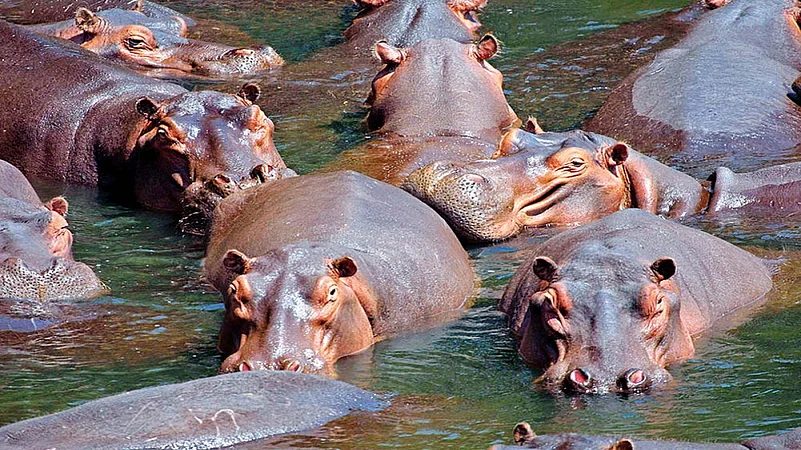Tucked between mountain ranges, the sprawling palace of Pablo Escobar in Puerto Triunfo, Colombia, was home to kangaroos, giraffes, elephants and other exotic animals—a private zoo of illegally imported animals that was the greatest ostentation of the feared drug kingpin as he reigned over the cocaine trade in the South American nation. Escobar and his Medellin Cartel are long dead, but one of the zoo’s prized specimens is flourishing in the tropical countryside and wetlands in and around the palace-turned-theme park—the hippopotamus.
Like the man who introduced them to this country after obtaining them from a US zoo, they are a source of endless controversy, reports the Associated Press. Government attempts to control their reproduction have had no real impact on population growth, with the number of hippos increasing in the past eight years from 35 to somewhere between 65 and 80. A group of scientists is now warning that the hippos pose a major threat to the area’s biodiversity and could lead to deadly encounters between the huge animals and humans. They say hippo numbers could reach around 1,500 by 2035 if nothing is done.
They say the animals need to be culled. “I believe that it is one of the greatest challenges of invasive species in the world,” said Nataly Castelblanco-Martínez, an ecologist at the University of Quintana Roo in Mexico and lead author of the group’s study. The idea of culling the herd has already drawn some criticism and is likely to see more.
There was an outcry years ago when three hippos wandered from the Escobar compound and were causing problems and one was killed by hunters sent after the animals. The humans in this rural area have embraced the hippos as their own, in part because of the tourist dollars they bring in. For outsiders, it can be a puzzling bond, considering the aggressive animals kill more people a year in Africa than any other wildlife species. But unlike in their native Africa, hippos have no natural predators in Colombia.
In the 1980s, Escobar arranged for three female hippos and one male to be brought to his 5,500-acre estate, Hacienda Napoles. After his death in a shootout with authorities in 1993, most of the exotic animals were relocated or died. But the hippos were abandoned at the estate due to the cost and logistical issues associated with transporting three-tonne animals and the violence that plagued the area at the time. The hippos thrive in the fertile region lying between Medellin and Colombia’s capital, Bogota..


























